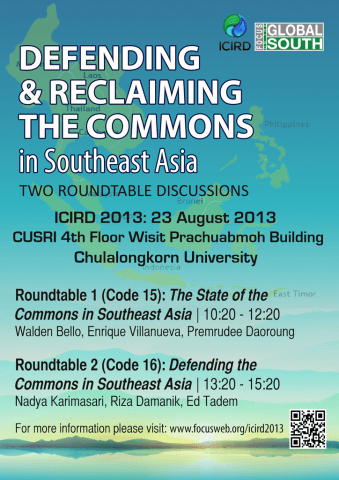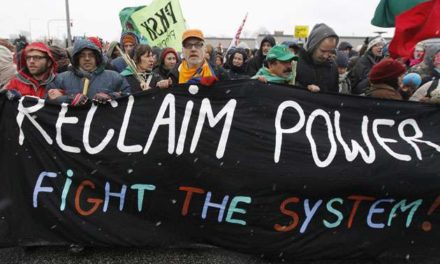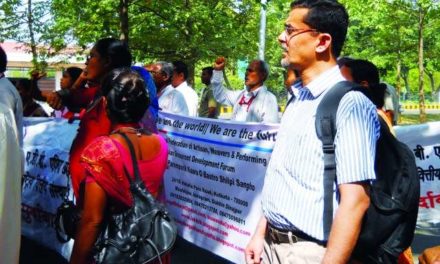23 August 2013 – FOCUS ON THE GLOBAL SOUTH
As financial and economic crises continue to spread in the “old” centres of capital in Europe and the United States, Asia is being hailed as the new engine of the global economic system, fulfilling the dual roles of producer and consumer. Across Southeast Asia, the quest for rapid economic growth dominates development goals and approaches. Privatisation, trade and investment liberalization, and market competitiveness have become the main elements of the preferred development model. Regardless of political leaning, governments in the region have sacrificed wealth redistribution, equity, human rights and the environment to the interests of capital, investors and high growth.
Southeast Asia’s fast growth is accompanied by increased inequality, concentration of wealth and assets in the higher income strata, and a steady erosion of the commons: natural, social, cultural and political. In the last two decades, average incomes increased in the region, but income disparities widened. Ownership of financial and real assets increases not only incomes, but also access to political power, decision-making and opportunities, creating vicious cycles of privilege and disenfranchisement. The growth model is protected through the criminalization of dissent, and abuse and violations of human rights of citizens and migrant populations.
As the social, ecological and political costs of this development model rise, the question of how Southeast Asia’s booming economies could shift from their present trajectory to a more equitable, ecological and democratic path becomes all the more pressing. This is important not only for ensuring social development and genuine democracy but equally because the ecosystems and resources underpinning the livelihoods of the vast majority of people in the region Asia are being destroyed by “business as usual” economic growth.
What are the impacts of Southeast Asia’s economic boom on the region’s commons and peoples? What would a different economic, social, ecological and political Southeast Asia look like? Where are the opportunities for transformation, rebuilding and defending the commons, and Global South solidarity? Who are the emerging social movements and social actors?
Focus on the Global South (Focus) invites conference participants to explore these questions in a two-part Round Table discussion, on August 23.
Round Table I (10:20-12:20): (CODE: 15) The State of the Commons in Southeast Asia
Venue: CUSRI-Conference Room. 4th Floor Wisit Prachuabmoh Building (Rufus D. Smith Library, near Henri Dunant Gate)
Moderator: Shalmali Guttal, Focus on the Global South
Impacts of the economic growth and development model on the commons:
Dr. Walden Bello, Member of the House of Representatives, Philippines
Democracy, public goods and citizenship:
Enrique Villanueva, Institute for Popular Democracy and Associative Water Centre of the Philippines.
Ecosystems, land and water:
Premrudee Daorong, TERRA, Thailand
Open discussion
Synthesis: Mary Anne Manahan, Focus on the Global South
—————————–
Round Table II (13:20-15:20): (CODE: 16) Defending the Commons in Southeast Asia
Venue: CUSRI-Conference Room. 4th Floor Wisit Prachuabmoh Building (Rufus D. Smith Library, near Henri Dunant Gate)
Moderator: Dorothy Guererro, Focus on the Global South
The commons as lived, practiced and created by communities:
Nadya Karimasari, Serikat Petani Indonesia, Indonesia
Challenging and resisting the growth/development model:
Riza Damanik, Institute for Global Justice, Indonesia
Alternative Approaches to Territorial Waters (transforming political-social relationships):
Eduardo Climaco Tadem, Professor of Asian Studies, University of the Philippines, Diliman, Philippines
Open discussion
Synthesis: Clarissa Militante, Focus on the Global South





![[IN PHOTOS] In Defense of Human Rights and Dignity Movement (iDEFEND) Mobilization on the fourth State of the Nation Address (SONA) of Ferdinand Marcos, Jr.](https://focusweb.org/wp-content/uploads/2025/07/1-150x150.jpg)



